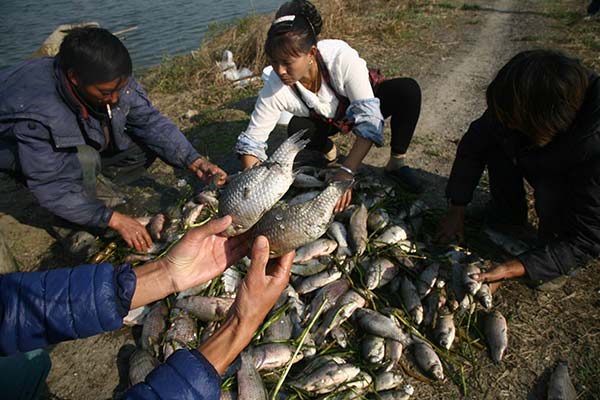Air pollution still public's top concern
Updated: 2015-10-13 07:38
By ZHENG JINRAN(China Daily)
|
|||||||||||
 |
|
Farmers collect dead fish from their pool which is suspected to have been contaminated by acid mist from a chemical plant nearby in Gaoyou, Jiangsu province, on Sunday. They planned to send the fish for examination. CHINA DAILY |
Almost 78 percent of complaints the public made to the national environmental watchdog on its hotline in the first half of this year was about air pollution.
However, the authority needs to improve its services to deal more effectively with the complaints, some hotline users suggested.
The Ministry of Environmental Protection received 696 reports related to pollution on the hotline 12369 in the first six months of the year, the same number as in 2014, the ministry said on Monday.
Of the 696 complaints, 497 cases were confirmed, and all the companies involved have been punished for polluting the environment. The ministry has ordered 196 companies to suspend production and shut down, the statement said.
The public is focused especially on air pollution, accounting for 540 complaints, or 77.8 percent. Air pollution has topped the complaints for two consecutive years, but with a slight decline of 2.6 percent this year, the statement said.
Many complaints also targeted polluting industries, as in previous years. The chemical industry was the subject of 163 complaints, with the nonmetallic mineral processing and metal processing industries also being a major source of concern, the ministry said.
In addition, four provinces in central and eastern regions-Henan, Jiangsu, Guangdong and Shandong-accounted for the highest number of reports, with 36.4 percent of the total nationwide. Guangdong province has seen complaints increase by 90.3 percent and Shandong province enjoyed a 38.4 percent decrease year-on-year.
Henan province once again ranked No 1, with the most complaints, same as last year, the ministry reported.
The hotline is one of the ways in which the public can monitor pollution and demonstrates their enthusiasm, yet there is no proper index to measure public participation, said Qin Tianbao, an environmental law professor at Wuhan University in Hubei province.
"The environmental authorities need to improve their service, including rapid feedback to the people who called, thus expanding the influence of the hotline and encouraging more people to use it," Qin said.
Guo Yongqi, a member of a green nongovernmental organization in Shandong province, said he and his friends reported illegally dumped garbage in a village via the hotline. The Liaocheng city environmental protection bureau gave them feedback within a week, saying they had dealt with it, but gave no detailed information.
"The hotline service cannot really meet my demands," Guo said.
Related Stories
Air pollution dominates complaints to environmental ministry 2015-10-12 17:38
China reports less pollution from burning straw 2015-10-09 20:56
Student charged 'pollution fee' for smoking on campus 2015-09-25 09:22
Harsh punishment for officials responsible for pollution 2015-09-17 17:27
Tight pollution controls affect major industries 2015-09-10 07:52
Today's Top News
China foreign trade decline narrows in September
Annaud 'stupefied' by Academy's decision to drop Wolf Totem
Germany continues border controls until November: media
Islamic State is prime suspect in Turkey bombing, as protests erupt
Opinion: Opportunity knocks for EU and China over next five years
Yuan rises for 7th day in a row, highest level since August
Reforms spark legal brain drain
High-tech zones up the game
Hot Topics
Lunar probe , China growth forecasts, Emission rules get tougher, China seen through 'colored lens', International board,
Editor's Picks

|

|

|

|

|

|






